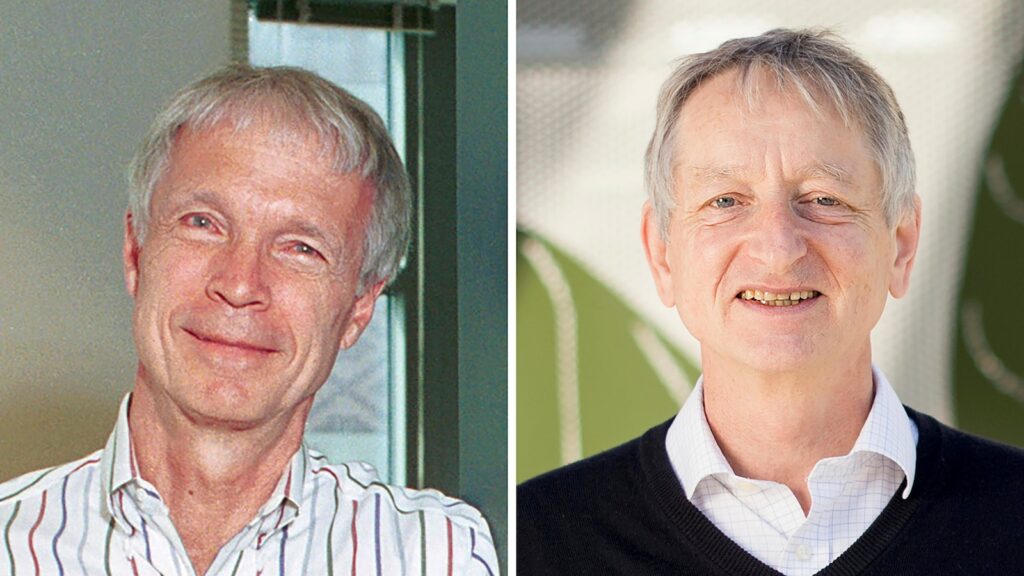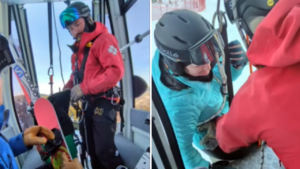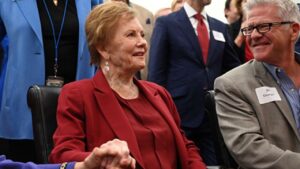Nobel Prize in physics awarded to two scientists for machine learning discoveries

STOCKHOLM — Two pioneers of artificial intelligence – John Hopfield and Geoffrey Hinton – won the Nobel Prize in physics Tuesday for helping create the building blocks of machine learning that is revolutionizing the way we work and live but also creates new threats to humanity, one of the winners said.
Hinton, who is known as the Godfather of artificial intelligence, is a citizen of Canada and Britain who works at the University of Toronto, and Hopfield is an American working at Princeton.
“These two gentlemen were really the pioneers,” said Nobel physics committee member Mark Pearce. “They … did the fundamental work, based on physical understanding which has led to the revolution we see today in machine learning and artificial intelligence.”
The artificial neural networks they pioneered are used throughout science and medicine and “have also become part of our daily lives, for instance in facial recognition and language translation,” said Ellen Moons, a member of the Nobel committee at the Royal Swedish Academy of Sciences.
Hinton predicted that AI will end up having a “huge influence” on civilization, bringing improvements in productivity and health care.
“It would be comparable with the Industrial Revolution,” he said in an open call with reporters and officials of the Royal Swedish Academy of Sciences.
“Instead of exceeding people in physical strength, it’s going to exceed people in intellectual ability. We have no experience of what it’s like to have things smarter than us. And it’s going to be wonderful in many respects,” Hinton said.
“But we also have to worry about a number of possible bad consequences, particularly the threat of these things getting out of control.”
The Nobel committee that honored the science behind machine learning and AI also mentioned fears about its possible flipside. Moons said that while it has “enormous benefits, its rapid development has also raised concerns about our future. Collectively, humans carry the responsibility for using this new technology in a safe and ethical way for the greatest benefit of humankind.”
Hinton shares those concerns. He quit a role at Google so he could more freely speak about the dangers of the technology he helped create.
“I am worried that the overall consequence of this might be systems more intelligent than us that eventually take control,” Hinton said.
On Tuesday, he said he was shocked at the honor.
“I’m flabbergasted. I had, no idea this would happen,” he said when reached by the Nobel committee on the phone. He said he was at a cheap hotel with no internet.
There was no immediate reaction from Hopfield.
Hinton, now 76, in the 1980s helped develop a technique known as backpropagation that has been instrumental in training machines how to “learn” by fine-tuning errors until they disappear. It’s similar to the way a student learns from a teacher with an initial solution graded and flaws identified and returned to be fixed and repaired. This process continues until the answer matches the network’s version of reality.
His team at the University of Toronto later wowed peers by using a neural network to win the prestigious ImageNet computer vision competition in 2012. That win spawned a flurry of copycats, giving birth to the rise of modern AI.
Hinton and fellow AI scientists Yoshua Bengio and Yann LeCun won computer science’s top prize, the Turing Award, in 2019.
“For a long time, people thought what the three of us were doing was nonsense,” Hinton told The Associated Press in 2019. “They thought we were very misguided and what we were doing was a very surprising thing for apparently intelligent people to waste their time on. My message to young researchers is, don’t be put off if everyone tells you what are doing is silly.”
And Hinton himself uses machine learning in his daily life.
“Whenever I want to know the answer to anything, I just go and ask GPT4,” Hinton said at the Nobel announcement. “I don’t totally trust it because it can hallucinate, but on almost everything it’s a not very good expert. And that’s very useful.”
“Twenty years ago, I think people would have happily agreed that systems with the ability of GPT-4 or (Google’s) Gemini had achieved general intelligence comparable to that of humans,” Hinton told the AP this spring. “Being able to answer more or less any question in a sensible way would have passed the test. But now that AI can do that, people want to change the test.”
Hopfield, 91, created an associative memory that can store and reconstruct images and other types of patterns in data, the Nobel committee said.
“What fascinates me most is still this question of how mind comes from machine,” Hopfield said in a video posted online by The Franklin Institute after it awarded him a physics prize in 2019.
Hinton used Hopfield’s network as the foundation for a new network that uses a different method, known as the Boltzmann machine, that the committee said can learn to recognise characteristic elements in a given type of data.
Six days of Nobel announcements opened Monday with Americans Victor Ambros and Gary Ruvkun winning the medicine prize for their discovery of tiny bits of genetic material that serve as on and off switches inside cells that help control what the cells do and when they do it. If scientists can better understand how they work and how to manipulate them, it could one day lead to powerful treatments for diseases like cancer.
The physics prize carries a cash award of 11 million Swedish kronor ($1 million) from a bequest left by the award’s creator, Swedish inventor Alfred Nobel. The laureates are invited to receive their awards at ceremonies on Dec. 10, the anniversary of Nobel’s death.
Nobel announcements continue with the chemistry prize on Wednesday and literature on Thursday. The Nobel Peace Prize will be announced Friday and the economics award on Oct. 14.
___
Corder reported from The Hague, Netherlands and Borenstein reported from Washington. Associated Press reporter Matt O’Brien contributed from Providence, Rhode Island.
<




